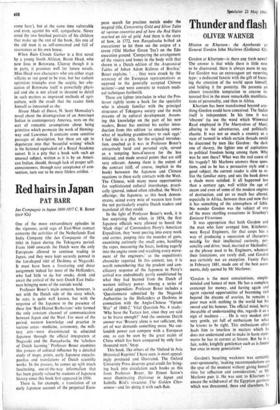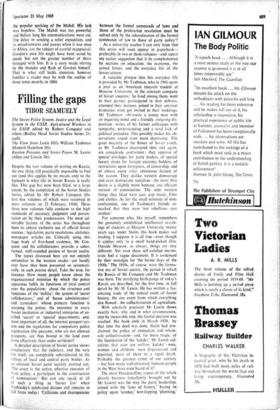Thunder and flash
OLIVER WARNER
Gordon at Khartum—is there any fresh news? The answer is that while there is little now to be discovered, there is always more to say. For Gordon was an extravagant yet recurring type: a dedicated fanatic with the gift of focus- ing the attention of the world upon himself, and holding it for posterity. He presents an almost irresistible temptation to anyone in- terested first in the more remarkable manifesta- tions of personality, and then in Africa.
Khartum has been transformed beyond any- thing Gordon could have conceived. The Sudan itself is independent. In his time it was 'obscure' (to use the word which Winwood Read employed in The Martyrdom of Man), alluring to the adventurous, and politically chaotic. It was not so much a country as a state of turmoil in which certain threads could -be discerned by men like Gordon: the dark one of slavery, the lighter one of aspirations to political freedom being among them. Why was he sent there? What was the real cause of his tragedy? Mr Marlowe answers these ques- tions, and as he has a persuasive style and a good subject, the current reader is able to re- live the familiar story, and sets the book down a shade more satisfied. It all happened less than a century ago, well within the age of steam and even of some of the modern engines of destruction, and yet so much has altered, especially in Africa, between then and now that it has something of the atmosphere of fable. No wonder Gordon was the subject of one of the more startling evocations in Strachey's Eminent Victorians.
It was appropriate that both Gordon and the man who later avenged him, Kitchener, were Royal Engineers, for that corps has a way of producing a succession of characters notable for their intellectual curiosity, per- sonality and drive; 'mad, married or Methodist,' as the phrase used to be. Engineers, whatever their limitations, are rarely dull, and Gordon was 'certainly not an exception. Vanity Fair, in February 1881, made one of the best asess- ments, duly quoted by Mr Marlowe:
'Gordon is the most conscientious, simple- minded and honest of men. He has a complete contempt for money, and having again and again rejected opportunities of becoming rich beyond the dreams of avarice, he remains a poor man with nothing in the world but his sword and his honour. The official mind, being incapable of understanding this, regards it as a sign of madness . . . He is very modest and very gentle, yet full of enthusiasm for what he knows to be right. This enthusiasm often leads him to interfere in matters which he does not understand and to make in haste state- ments he has to correct at leisure. But he is a fair, noble; knightly gentleman such as is found but once in many generations.'
Gordon's besetting weakness was certainly over-spontaneity, 'making recommendations on the spur of the moment without giving himself time for reflection and consideration,' as Mr Marlowe puts it. He was sent to Khartum to ensure the withdrawal of the Egyptian garrison which was threatened, there and elsewhere, by
the -popular uprising of the Mandi. His task was hopeless. The Mandi was too powerful, and before long his communications were cut. The delay in sending a relief expedition, and its misadventures and pauses when it was once in Africa, are the subject of careful reappraisal. Gordon's own life might have been saved by speed, but not the greater number of those besieged with him. It is a story made stirring by the thunder and flash of Gordon himself. That is what still holds attention, however familiar a reader may be with the outline of those tense months in 1884.







































 Previous page
Previous page